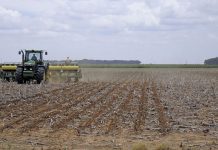Fertiliser company Foskor will go public next year, when it lists on the JSE. This is according to an announcement by the Industrial Development Corporation (IDC), which owns a 97,5% stake in Foskor, a phosphate and phosphoric acid producing company. I n just three years, the once-ailing Foskor has become one of the biggest single successes to list on the JSE. “Since [president and CEO] Alfred Pitse took over the company, it has gone from strength to strength,” commented the IDC’s chief executive Geoffrey Qhena.
“Also, bringing in expertise from India’s Coromandel Fertilisers helped improve efficiencies and cut costs. Foskor has gone from a value of R1,5 billion last year to R9,5 billion this year.” T he IDC said that once Foskor goes public in the fourth quarter of 2009, its value could double to R18 billion because of the soaring food prices and sky-rocketing fertiliser costs. However, Foskor has come under much criticism recently for pushing up the price of phosphorous.
Dr John Purchase, head of the Agricultural Business Chamber, said, “Foskor is the only supplier in South Africa and sells its local products at import parity, which is unnecessary, because it exports some of its phosphorous. The international phosphate market has doubled in value in the past year and phosphorous has become a very big problem because it’s so expensive.”
But Dr Gert van der Linde, who is the director of the Fertiliser Society of South Africa and who previously worked for Foskor, said that Foskor sold its phosphorous at between 50% and 60% of import parity to local companies such as Sasol Nitro and Omnia. “SA uses about 600 000t of nitrogen, phosphorous and potassium (NPK) per year,” said Van der Linde. “Of that, 80 000t, or 13%, is phosphorous.
Some 50% of nitrogen and 100% of potassium is imported, which means local fertiliser prices will naturally be high. The claims that Foskor is pushing up the price of fertiliser are unfounded because phosphorous only makes up 13% of the NPK price.” Van der Linde foresaw little relief from increasing fertiliser prices as oil peaked at US0/barrel. “Oil and fertiliser are so closely linked that when oil starts stabilising, the fertiliser price will too,” he said. – David Steynberg
Limpopo farmers reminded of winter fire risk
TAU SA’S North president Dries Joubert has called on farmers in Limpopo to be prepared for veld fires over the coming months. He also reminded them they have to comply with legislation on veld fires and implored them to see that their fire breaks are kept clean and their fire-fighting equipment is in order. By law, all farmers have to belong to a district fire protection association. Joubert said it’s important to remember that most wild fires start out as controlled fires. And with the good early summer rains in most parts of the province, there are still a lot of grass and leaves in the veld. Joubert warned that the grass is now tinder-dry, posing a great fire risk. – Staff reporter








